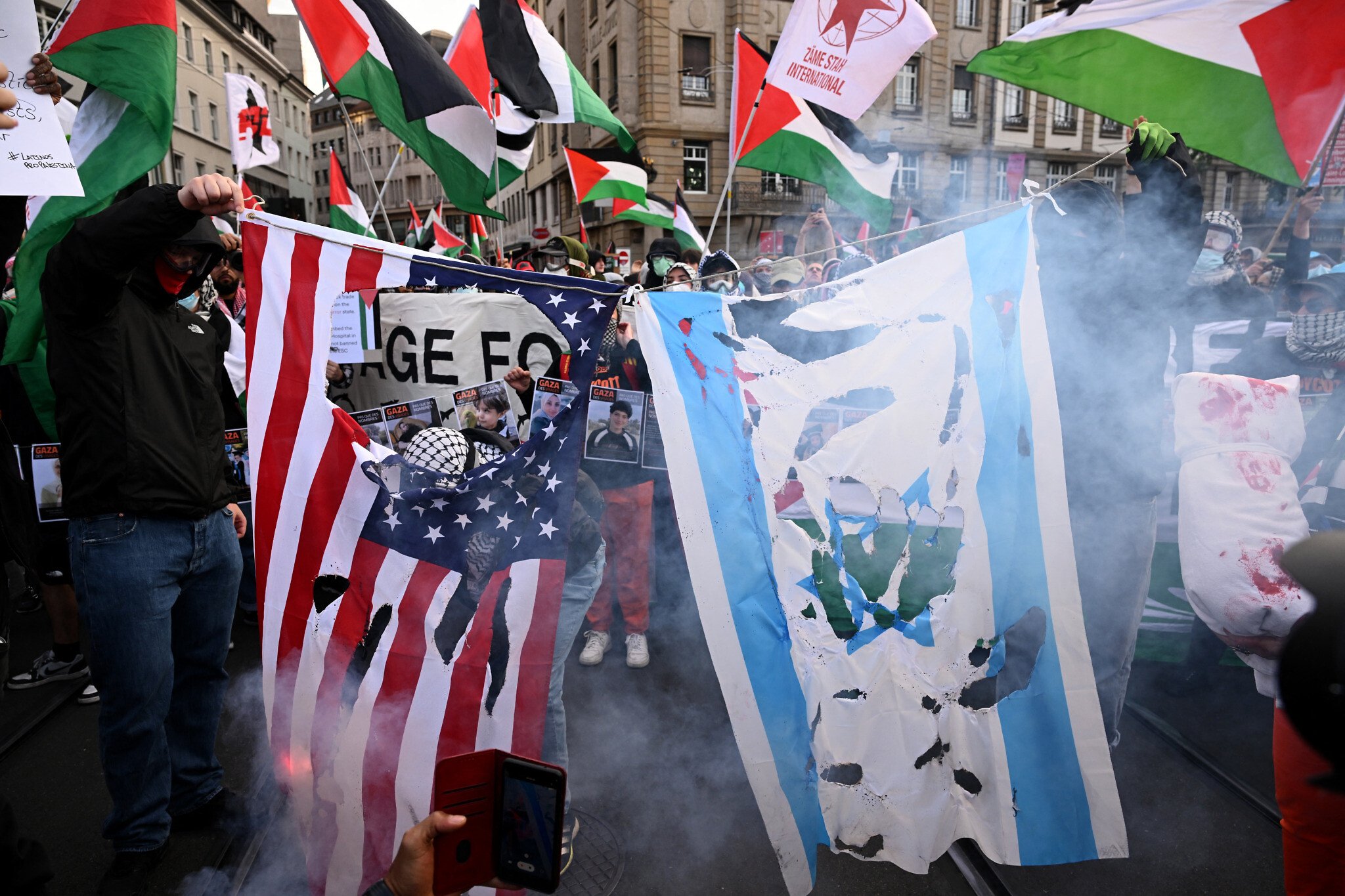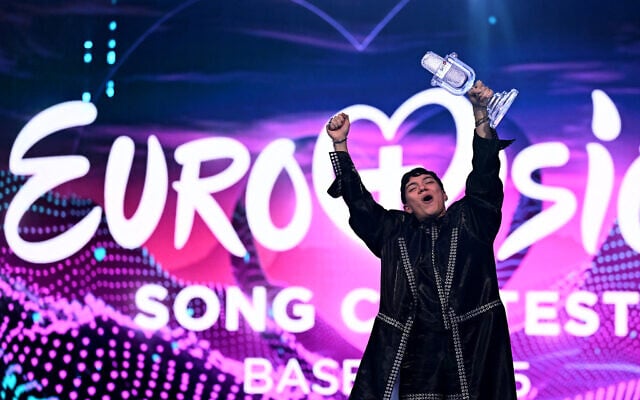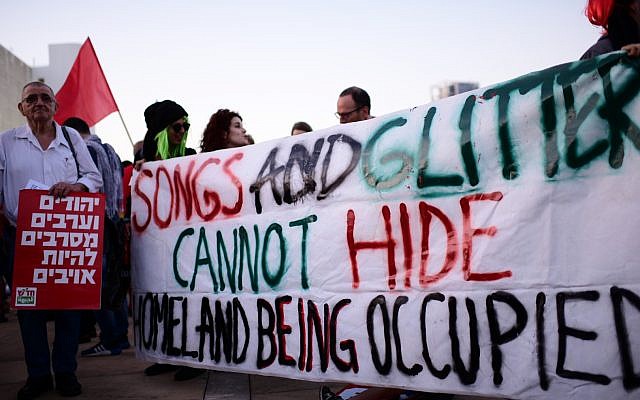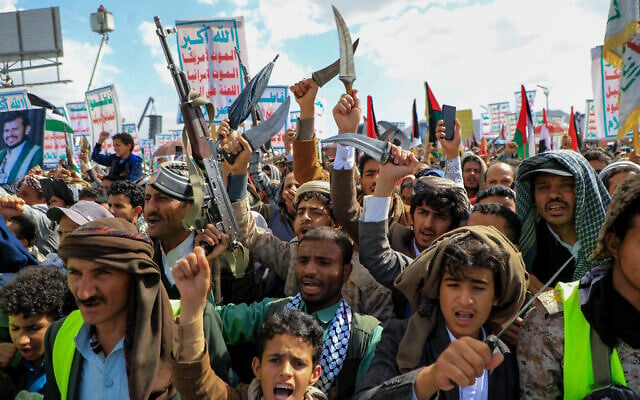



Israel dodged a bullet early Sunday morning, thanks to a Dubai-raised Austrian countertenor and his operatic ballad about unrequited ardor. It’s likely many in both Israel and the European Broadcasting Union are thanking JJ for saving them from what may have been a poison pill of a victory at the Eurovision Song Contest in Basel, Switzerland, Saturday night.
Had he not, the appreciation shown for Israel at the contest may have been wasted love indeed.
Second place may be the first loser, but in this instance, there is a case to be made that Israel won everything it could have hoped for by falling just short at the campy, yet important in its own way, song competition.
The competition gave Israel a massive international stage from which to showcase the talent and resilience of someone who survived the Hamas terror group’s murderous rampage through southern Israel less than two years ago.
It won an astounding show of love from the world for a country that has felt under attack since October 7, 2023 — letting it know that perhaps it is not the pariah some world leaders make it out to be.
But perhaps the best part of coming in second is that it now shoulders none of the baggage that comes with winning the whole enchilada.
For proof of the complications that may have accompanied an Israeli victory, one need look — or hear — no further than the rocket alarms that blared across much of the country just as the final results were being announced at the St. Jakobshalle arena in Basel.
But it’s not only the security concerns that would have come with winning hosting duties. Nor is it even the price tag involved in putting on a big, showy extravaganza, for an already hurting public dealing with the disastrous economic fallout of fighting a costly war that occupies a good chunk of Israel’s labor force.
It’s that a win would have focused a Swiss bank vault’s worth of unwanted attention on Israel. It would have sparked yet more political fights at home and abroad. And it could have forced the country to wrestle with the unfathomably acerbic test of pretending all is hunky dory while hostages continue to languish in Gaza’s tunnels.
There are plenty of wins Israel could use right now, Eurovision is not one of them.
In the lead-up to Eurovision, an undue amount of attention was showered on Israel and singer Yuval Raphael. Little of it was due to her harrowing story of survival or powerful singing. For two years running now, Israel has faced calls to be expelled from the song competition from artists, pro-Palestinian activists, politicians and others.
This year, the boo-crew starred reigning winner Nemo, several members of the European Parliament and four participating public broadcasters, including from Iceland, which rode what seemed like a rip-off of an Israeli pop ditty to a 25th place finish, out of 26 participants in Saturday’s grand final.
When the artists were introduced at a parade in Basel early last week, Palestinian flags easily outnumbered any others on display at the famously nationalistic event, and one can surmise they were not there to support allowing a Palestinian entry into the yearly shmaltzfest.
Such was the zeitgeist that when Raphael performed at Thursday’s semifinal, it already felt like a victory that the crowd didn’t jeer for too long.
One can only imagine the effect those same forces would have exerted had Israel won and been handed hosting duties. The EBU has been firm in rejecting the calls to expel Israel, but it’s unlikely it would have had the same ability to shut down any number of countries who might decide to boycott an Israel-hosted Eurovision, or who might send acts to use the stage as a platform to push anti-Israel messaging.
Giving Israel hosting duties would turn the loud — but apparently unrepresentative — anti-Israel sentiment at the contest from a side show into the main act, giving it the very oxygen Israel seeks to deprive it.
Would Israel soldier on, trying to hype up a half-hearted display that attracts the likes of Molvania’s Zlad? Would it waste a year and untold energy trying to sell itself as worthy to host a song contest that once gave a trophy to these guys? Happily, nobody has to find out.
The tribulations of 2019 — the last time Israel hosted — seem quaint when compared to the state of Israel today, but that year saw no shortage of controversies, which would only have been magnified by a second Israel win in seven years.
Perhaps in the spirit of Eurovision’s tradition of ultimately pointless displays, Israel’s government at the time made a show of insisting that the contest be held in Jerusalem, only to cave to demands that it move to Tel Aviv.
Across Europe, anti-Israel protests became the norm at national contests held to pick entrants. Even Madonna got in the act, using her guest performance as protest material. Days earlier, as rehearsals began, Hamas and Islamic Jihad began lobbing rockets from Gaza into Israel, briefly putting the whole shebang into doubt and perhaps making some visitors think twice about Israel as a safe destination.
As things stand now, though, it’s unlikely Israel would have hosted even had it won. With international airlines continuing to stay away and war in Gaza ongoing, the EBU would have been expected to shift hosting duties elsewhere, as it did when Ukraine won in 2022.
Yemen’s missile-happy Houthis are already riding high after fighting the most powerful military in the world to a stalemate and seemingly outlasting every major sortie Israel throws at it.
Keeping Israel from being able to host would just prove the effectiveness of its supposed “air embargo” on the country.
To be sure, it’s hard to say unequivocally that winning would have been an unmitigated calamity. It would have likely been a nice pick-me-up and could have focused fresh attention on the hostages (though Hamas and Israel’s own hardliners might not be swayed by the be-sequined purveyors of European glam-pop).
Perhaps a year from now, with the living hostages home to their families and the slain hostages safely interred by their loved ones, with the north being rebuilt, reservists back home and contributing to the economy, and Hamas and the Houthis but a memory, Israelis will turn on their TVs as some Austrian pop star in a bewildering get-up welcomes millions of viewers in German-accented English and think “that could have been us.” Such are the dreams Eurovision is made of.







